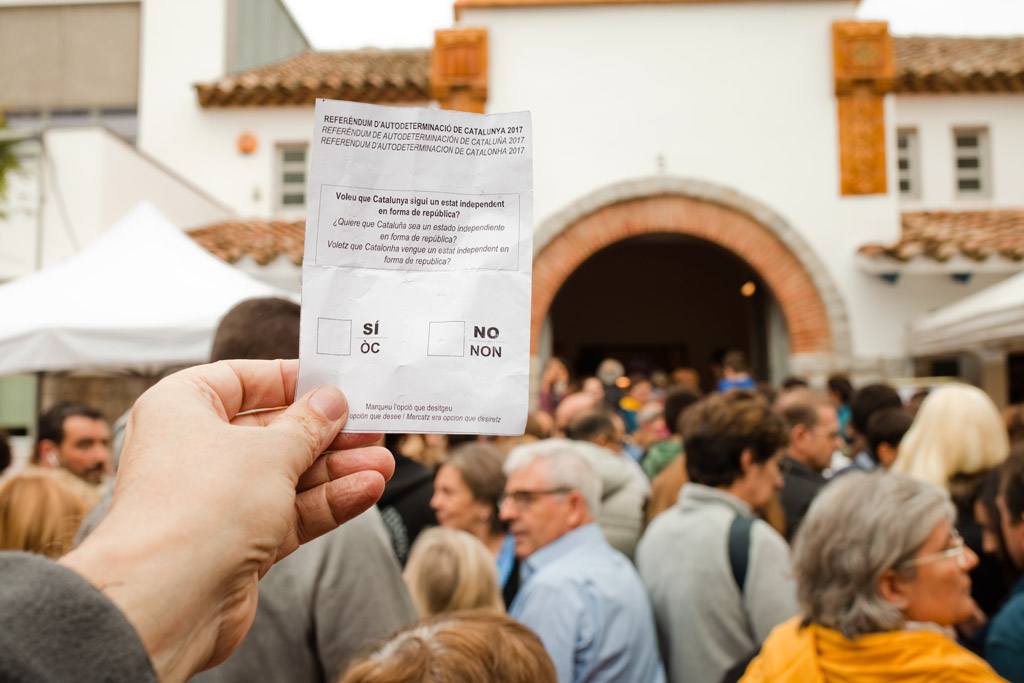The Fight for Freedom

On October 1, 2017, the Spanish region of Catalonia held a referendum for independence from Spain. Of the circa 7.5 million inhabitants of the Catalonian province, less than a third showed up to cast their ballots in the so-called illegal vote for Catalonian independence. Of the 2.2 million Catalonian citizens that came out to vote, unofficial reports state that almost 90% voted in favor of independence from Spain. The mayor of Catalonia, Carles Puigdemont, and other regional leaders have signed a declaration of independence from Spain that calls for Catalonia to be called "an independent and sovereign state." The goal of Catalonian independence has caused numerous violent protests between the pro-independence movement and the Spanish police force, as the Spanish central government has dismissed the results of the referendum.
Image Credit: flickr/Miquel Bohigas CostabellaWhat would independence mean for Catalonia?
Catalonia already has some factors that would potentially ease its independence: the flag that represents their nation as well as a parliament with a leader—Carles Puigdemont. The parliament holds power over the Catalan police forces: Mosses d'Esquadra, over the public school, and health system. Catalan is one of the more wealthy provinces of Spain due to its tourism. Of the 75 million tourists that visit Spain yearly, 18 million of them choose Catalan as their main destination - showing its popularity. Additionally, Catalonia makes up 19% of the total Spanish GDP (Gross Domestic Product - the most effective way to measure a nation's economy), yet the money it pays in taxes is more than the amount they receive in government programs.
Independence for Catalonia would also require for its government to step up its role in society. They would have to establish border control and customs, alongside proper international relations. A large challenge for the region would be on whether it would still be able to benefit from European Union (EU) relationships. In order for a country or independent state to enter into the EU, it must be approved by all members—including Spain. Considering that circa 2/3 of Catalonia's exports go towards outside of Spain. Their exports to the rest of the EU would be a potential aid to join the EU and need for Catalonia's survival. They can look at the possibility of a relationship such as that between Norway and the EU, where they would have single-market access, without having to join the EU.
Image Credit: flickr/Theresa Grua Ros
Why does Spain refuse Catalonia's independence?
If Catalonia gains independence, it could cause a domino effect all across Europe, which would be disastrous for both Spain and the rest of the EU. States that desire independence throughout Europe will use Catalonia as their example. Therefore the potential entrance into the EU would also be limited. Spain has been a unified nation for the past 500 years and has encountered this issue of separation numerous times, as well as overcome it. The Spanish parliament that is situated in Madrid, has said that the province of Catalonia is overstepping Article 155 from the Spanish Constitution—an article that states that the Spanish government can suspend home rule or regional government if they are putting the Spanish nation in jeopardy.
A separation from Spain would cause a significant amount of tax income to disappear from the Spanish government, forcing the Spanish government to compensate in a drastic way. Additionally, there is the national Spanish debt, how would that be divided, considering Catalonia should also be held responsible for the Spanish debt. Besides financial insecurity, the so-called illegal referendum also brings a lot of tension and violence. There were clashes between the Spanish police force, the Catalonian police force, the protestors, and the voters after the referendum took place.
Image Credit: Flickr/Just Click 2017
AUP insight:
AUP student Marina Simiaut, who is a Spanish native, gave us some input on how she believes the Catalonian referendum will impact Spain. When asked if Marina believes that Catalonia will become an independent state, she responded "No, Catalonia will never be an independent state from Spain. Spanish Government and population will never allow that to happen. It has been attempted several times in the past and the result has been always de same: turmoil, social unrest and hatred between citizens." Marina continues to say that this will only have a negative impact on the nation and the state's political, economic, and social situations, as there are now tensions on all fronts between Catalonia and Spain.
Whether or not Catalonia will go through with its separation from Spain, the referendum represents a widespread desire for independence. This desire is one that is currently very present in the world. We seem to be living in the midst of a global reorganization, and while this might mark the end of the fight for Catalonia, it could be the beginning for the rest of the world.










